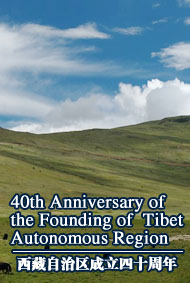|
Birth Rituals
( 2005-10-27 )
The birth ritual of Southwest China's Tibet Autonomous Region is called Pangse (to get rid of bad luck) in Tibetan, with pan meaning "fowls" and se, "cleaning away." Tibetans believe newborn babies come to the world alongside fowls, and that a ceremony should be held to wipe them off to enable the babies to grow healthily and mothers to recover soon. Such rituals, which evolved from a Bon religious god-worshipping ritual, have existed for more than 1,500 years. Most Tibetans like to have more children, which symbolizes a growing family.
 When a baby is born When a baby is born
On the third day after a Tibetan boy (the fourth day for a girl) is born, the relatives and good friends carry chang (highland barley wine), butter tea, and clothes for the newborn to show congratulations. As soon as they enter the house, they presenthadascarves to the baby's parents and then the baby. Then they offer toasts, present gifts, and examine the baby while offering good wishes. Some families throw in a pancake feast to entertain the visitors.
At the same time, the Pangse ceremony, which originated from the Tubo Kingdom (629-846), is held.
In the morning, the people pick some white small stones and pile them in front of the family where a child is born to show a boy was born; when a girl is born, the people can pick any kind of stones to pile in the front of the house. At the same time, the people burn pine branches. The guests, to show congratulations, sprinkle tsampa (roasted flour usually mixed with tea) on the stone before entering the host house.
 When the baby is one month old When the baby is one month old
When the baby is one month old, a ritual is held on an auspicious day to take the baby out of the home. On that day, the mother with her child, both newly dressed, will go out, followed by their relatives.
First, they go to thetemple(to the Jokhang Temple inLhasa) to pray to the Buddha for a long life for the baby and also for blessing. Then they visit the relatives. Sometimes they select some lucky family to visit so the family can pray that the baby will have a happy family in the future.
When the baby goes out for the first time, the people often take some soot from the bottom of a pot and put it on the baby's nose, which means that the devils will find the baby when he or she goes out.
 Naming Naming
The newborn baby is not given a name until the end of the birth rituals. Generally, a Living Buddha or a prestigious senior villager is invited to give a name, which usually comes from theBuddhismscriptures including some words symbolizing happiness or luck; however, there are also cases when the parents name the baby. No matter who names the baby, the naming is done according to the will of the baby's parents for auspiciousness.
|

